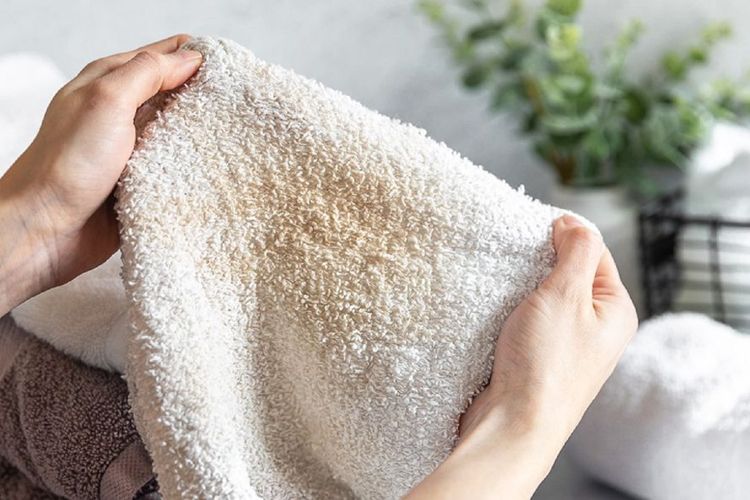How Often Should You Wash White Sheets or White Bedding?

Nothing quite like the feeling of climbing into a freshly-made bed with crisp, white sheets. But as luxurious as they may be, keeping those white sheets clean can be a challenge. From makeup stains to sweat and dirt, it's no wonder many of us wonder how often we should wash them.
Should we be laundering them after every use, or is it okay to stretch out the time between washes?
Let's take a deep dive into the question of how often you should wash white sheets and bedding, and I give you some tips on how to keep them looking bright and beautiful for as long as possible.
General Guidelines?

While there isn't a set frequency for washing white sheets, there are some basic recommendations you can follow.
Let's say, if the bed is used every day, many professionals advise washing the sheets once a week. If the occupant of the bed has allergies or if the linens are dirty or stained, you might also recommend washing them more frequently.
" What Determine The Frequency Of Washing? "
1. Personal Preference.

Everyone has different standards for cleanliness and comfort, and these can vary based on individual habits, cultural norms, and personal preferences.
Let's say, some individuals might prefer a brand-new, spotless bed every night and find it uncomfortable to sleep in linens that have been used for more than a few days, while others might feel more at ease using their bedding before cleaning it.
Personal preferences in terms of bedding cleanliness can be influenced by elements such as the scent, appearance, texture, and feel of the sheets. Some people might even prefer the natural scent of their body oils on their bedding over the scent of newly washed sheets, finding the former to be more calming and soothing.
2. Your Lifestyle.

Different lifestyles can result in varying levels of sweat, dirt, and debris that can accumulate on bedding and necessitate more frequent washing.
Let me give an example, active individuals, such as athletes or people who exercise frequently, typically perspire more and need to launder their bedding more often. The sheets may become contaminated with sweat and bacteria, resulting in unpleasant smells and possibly irritating the skin.
People who work in physically demanding occupations, like construction or landscaping, may also need to wash their sheets more frequently to get rid of sweat and dirt. Similarly, individuals who work in environments with high levels of dust or pollutants may need to wash their bedding more often to maintain a clean sleeping environment.
3. Allergies.

People with allergies or sensitive skin may need to wash their bedding more frequently to remove allergens and bacteria that can cause irritation or discomfort.
A buildup of allergens, such as pollen, dust mites, and pet dander, can trigger allergic responses in susceptible individuals, resulting in symptoms like congestion, runny nose, itching, and sneezing.
Regularly washing bedding can help to eliminate these allergens, which can reduce the frequency and intensity of allergic reactions.
In addition to allergens, bacteria can also build up on linens, which can irritate and damage the skin. People with sensitive skin may be more susceptible to these germs, so they may need to launder their bedding more often to keep their skin healthy.
It's important to note that individuals with allergies or sensitive skin may also be affected by the detergent and fabric softener used. Some detergents and fabric softeners contain fragrances and other chemicals that can irritate the skin and trigger allergic reactions in some people. Using hypoallergenic, fragrance-free detergents and fabric softeners can help to reduce the likelihood of these reactions.
4. Pets.

If you have pets that sleep on your bed, you may need to wash your bedding more frequently to remove pet hair, dander, and other debris that can accumulate on the bedding.
The buildup of pet hair and dander on bedding can cause allergic reactions in susceptible individuals, resulting in symptoms such as runny nose, congestion, itching, and sneezing. Regular washing of bedding can help eliminate these allergens and reduce the frequency and severity of allergic reactions.
Pet dander and hair can also leave an unpleasant odor on the bedding, which can be difficult to get rid of. Regular washing can help eliminate these smells, leaving the bedding smelling fresh and clean. Additionally, pets may bring in dust and other debris from outside, which can cling to the bedding and soil it, requiring more frequent washings to maintain a clean sleeping environment.
5. Illness.

People who are sick or have been in contact with someone who is sick may need to wash their bedding more often to prevent the spread of germs.
When a person is ill, their bedding can become contaminated with pathogens that can spread to other objects or people. Regularly washing bedding can help eliminate these germs and aid in the prevention of disease.
It's important to keep in mind that different illnesses may require varying degrees of cleaning and disinfection. For example, more strict cleansing and disinfection procedures may be necessary for illnesses such as the flu or COVID-19 than for a simple cold. It is recommended to follow the advice of health authorities or medical experts for specific guidance on cleaning and disinfecting during an illness.
" What Are The Tips To Take Care Of My White Bedding Between Washing? "

- Shake out your bedding every morning to remove dust and debris.
- Avoid eating or drinking in bed to prevent spills and stains.
- Use a bedspread or throw to protect your bedding from spills and stains.
- Keep pets off your bedding to prevent pet hair and stains.
- Wash your face before bed to prevent oil and dirt from transferring to your sheets.
- Use a mattress cover to protect your bedding from sweat and other accidents.
- Change your bedding once a week to keep it clean and avoid sweat and dirt buildup.
- Use a linen spray to keep your linens smelling fresh between washings.
- Air out your bedding outside in good weather to refresh it.
Sleeping on freshly laundered white sheets can be a luxurious experience. Whether you prefer to wash your bedding weekly or more frequently, there is no such thing as overdoing it when it comes to keeping your white sheets bright and clean.
Sweet dreams!


